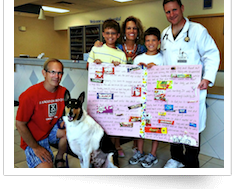About Cancer in Pets
 Cancer in pets may seem like it is on the rise. While that may be, it is more likely because advancements in diagnostics and knowledge about the disease process are becoming more prevalent in the veterinary community. Through increased preventative medicine, our pets are living longer than ever before. Your pet's veterinarian is able to diagnose things like heart disease, liver and kidney failure much sooner than before through routine visits and bloodwork. So why do we care about cancer in pets?
Cancer in pets may seem like it is on the rise. While that may be, it is more likely because advancements in diagnostics and knowledge about the disease process are becoming more prevalent in the veterinary community. Through increased preventative medicine, our pets are living longer than ever before. Your pet's veterinarian is able to diagnose things like heart disease, liver and kidney failure much sooner than before through routine visits and bloodwork. So why do we care about cancer in pets?
The foremost reason is that now, more than ever, our pets play an increasingly large role in our family dynamics. Our pets are our children, our siblings, and our best friends. Our pets hold a special place in our heart and we want them to live happy and healthy lives. Unfortunately, as in humans, cancer is a horrible affliction that can cut our pets' lives short. Forty-one percent of people surveyed in 2005 by the Morris Animal Foundation ranked cancer as their top concern for their pets' health, followed by heart disease at 7%. In fact, there are approximately 165 million dogs and cats in the United states and each is at risk of developing cancer (American Pet Products Association 2011-2012 National Pet Owners Survey).
Veterinarians, researchers, and physicians are not only interested in veterinary oncology but also comparative oncology. Comparative oncology is a branch of oncology that studies the relationship between cancers found in pets and in humans. In fact, many of the common cancers found in our pets have similarities to the cancers found in humans as well. Both veterinary and human medicine are working together to better understand the disease process, and use information gathered in each field to build a stronger foundation of knowledge.




